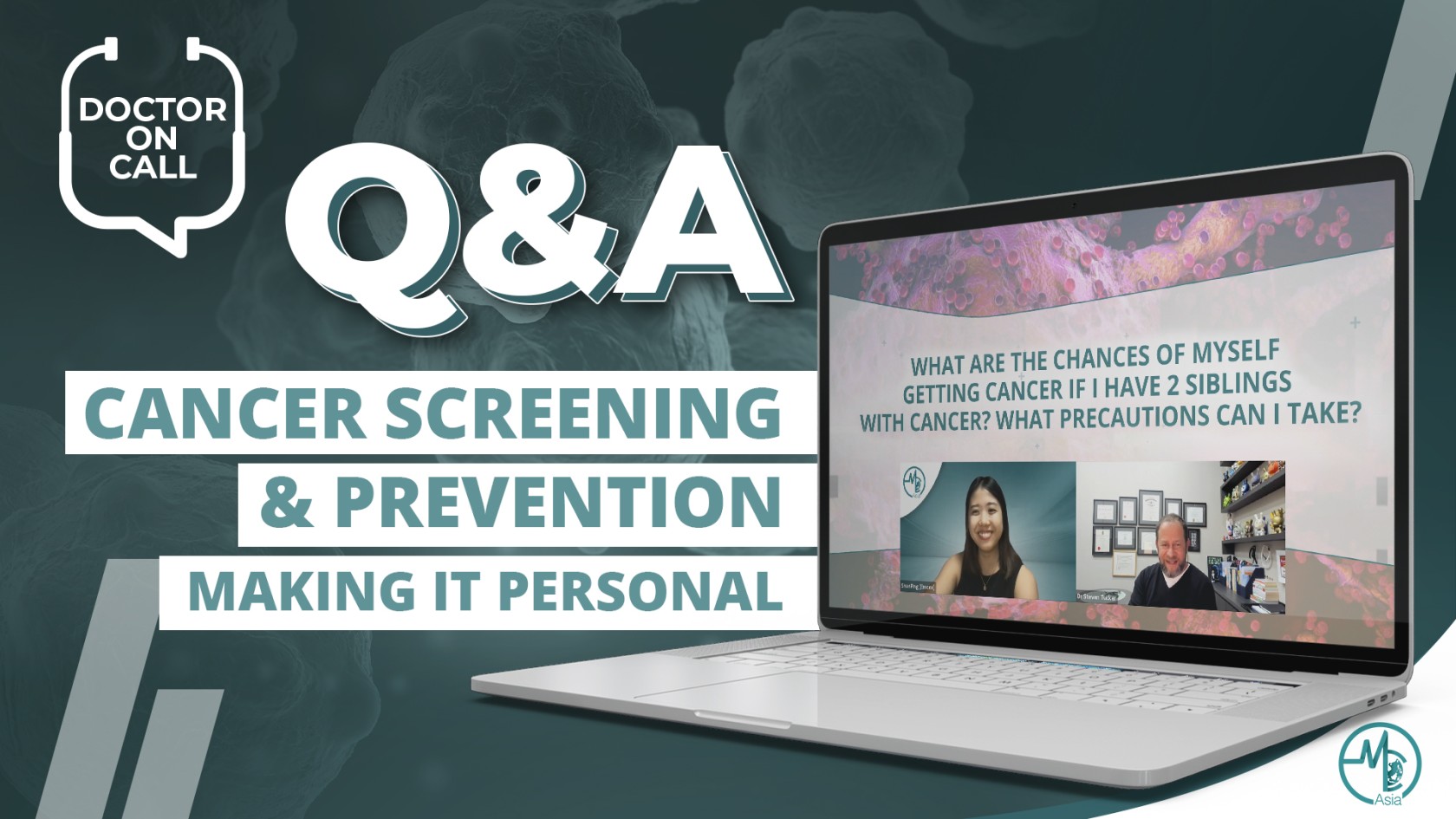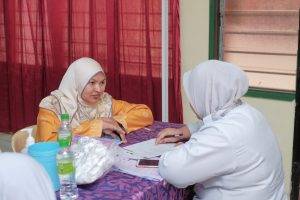Doctor On Call, or DOC for short, is a brand new series brought to you by Medical Channel Asia. This series aims to bring doctors and specialists from various fields to give you an introduction to common health and medical topics that you and the Asian population are interested in. In our 11th DOC, we had Dr Steven Tucker, Medical Oncologist and founder of Tucker Medical, Singapore, talk to us about Cancer Screening and Prevention.
PSA: Medical Channel Asia (MCA) is now on Telegram! Join us here https://t.me/MedicalChannelAsia for daily reads and the latest updates at your fingertips!
For Part 1 of the forum, we have Dr Steven Tucker give us a presentation on cancer screening, personalised screening and preventing cancer.
In Part 2, Dr Steven Tucker goes through many questions posted by our enthusiastic audience, both collated from the registration process, and also posted LIVE.
Question and Answer
Q1: What specific cancer screening tests are recommended for a healthy male? Is a full blood test sufficient?
A screening programme for both men and women should look at the obvious pieces of information. This can include liver function, kidney function, weight, blood pressure, and cholesterol levels. Cancer screening is like health screening – since obesity, diabetes and metabolic diseases are drivers of cancer, screening for general health can determine the risks of cancer developing.
Dr Tucker suggests a regular blood test, looking at hormones, markers of inflammation, markers of diabetes, insulin resistance, or fatty liver; as well as a physical examination and history taking with a regular doctor (one with a routine and long-term relationship with you).
Q2: Are there screening tests that I can do at home?
You can check your weight and blood pressure at home. There are also devices in the market e.g. FitBit, and phones, that can track your activity level to ensure that you are as active as you should be.
Dr Tucker also recommends asking yourself a question at home – When you wake up in the morning, do you feel refreshed? This can help you assess your current life and lifestyle. If you don’t wake up feeling refreshed, something in the system could be wrong. You can then rethink your lifestyle choices, and make changes to feel better, reduce stress, reduce weight and stay active.
Q3: What are the chances of myself getting cancer if I have 2 siblings with cancer? What precautions can I take?
Generally, there is some measurable or appreciable increased risk if you have 2 siblings with cancer, compared to a family that doesn’t have any cancer in it. However, to answer the question accurately, more information is needed. This can include the kind of cancer, the age of onset, and if the cancer was deadly.
There are some family trees where cancer does happen, but people don’t die from it. There are certain cancers that do not have as much of an inherited element, such as blood cancers. Leukemias and certain rare cancers are far less associated with inheritable risk. On the other hand, if you have 2 sisters with breast cancer before 40 years of age, and you are the youngest sister, there is a real risk.
You should discuss this situation with healthcare professionals, be it a cancer preventive doctor, geneticist, or breast cancer surgeon. They understand the literature and can walk you (the patient) through the risks and benefits and the rationale for offering or doing genetic testing to personalize your risk reduction.
Q4: What’s the difference between ultrasound and mammography for breast cancer? Which one is more important?
As a general answer, mammograms are more important than ultrasounds. Ultrasound is good for very dense breasts, but a mammogram is a gold standard for screening for breast cancer in the right age group.
Ultrasound uses sound waves that are going to bounce towards the breast and the tissue and then bounce back and be measured and give an echo measurement. And depending on the tissue, we can identify what’s more fibrous, what’s softer, what’s more fatty, and what’s harder, and get shapes and sounds as a reverberation.
A mammogram is a traditional x-ray. X-rays go through the breast tissue onto a plate or a digital background where the physician will see a different set of information altogether. Mammograms are good for looking at calcifications and fibrocystic changes.
They are two different and complementary techniques. Much like looking at an item with infrared goggles as well as with colour vision – different information from 2 different sets of eyes.
Q5: If I have a family history of different cancers: liver, breast, pancreas, colon cancer. Does that mean my risk is very high?
Your risk is elevated. In a family tree that includes those cancers, the individuals in that family likely have an increased risk.
This is especially so in the case of pancreatic cancer in the family, as that can have some inherited susceptibility. It is important for the physician to take a good family history and understand who in the family had pancreatic cancer, as there is evolving information to suggest that MRI or CT scans may be warranted when patients come from a family history of pancreatic cancer. This is much like how mammograms are indicated if one comes from a strong family history of breast cancer. Pancreatic cancer usually shows up at Stage 4, so it is good to be able to detect and diagnose early.
If you know who in the family had cancer, and at what age they had cancer, screening for others at risk should start 10 years earlier as a good rule of thumb (not including childhood cancers).
Q6: My mother was diagnosed with breast cancer. As a man in his 40s, should I be concerned about my risk of breast cancer?
Men do get breast cancer. In the United States, there are about 200,000 to 240,000 cases of breast cancer every year, with about 2000 to 3000 cases being male breast cancer, a small fraction of the total breast cancer burden. An overwhelming majority of male breast cancer cases occur in the setting of hereditary breast and ovarian cancer syndrome (HBOC). It is also overwhelmingly common (though not exclusive) that male breast cancer is associated with a variation or mutation in the BRCA2 gene.
If there is no male breast cancer in this person’s family and there is only one breast cancer in the family, then the individual may not have an elevated risk of breast cancer. But depending upon the circumstances of the mother’s breast cancer, early onset or her familial risk or other cancers in the family, he may have an elevated risk for pancreatic or prostate or male breast, or certain skin cancers. These cancers are the ones that go with hereditary breast and ovarian cancer syndrome.
Q7: Is there particular cancer that is more likely to be inherited?
Some cancers with a higher risk of inheritance are colon, breast, and ovarian cancers.
The most common cancers in most of the developed world are colon cancer, lung cancer, breast cancer, and prostate cancer. Three out of those four have a strong background in lifestyle and metabolic health. Smoking and lung cancer are also very clearly associated.
Oncologists and even good family medicine doctors know to take history and refer patients with colon cancer, breast/ovarian cancer, and prostate cancer family history to specialists so that they can get a personalized screening program and personalized risk reduction advice.
Q8: Are genetic checks invasive?
There are two common ways to obtain a sample for genetic checks. There is a simple blood test, much like blood tests, a tube of blood is collected. Increasingly, genetic testing can be done through just a cheek swab. This is done with a cotton swab, on the inside of the mouth. The sample can be used to scan the DNA for inherited susceptibility to cancer and other chronic diseases.
Q9: Can other samples e.g. hair samples be used?
There is something called circulating free DNA as a potential screening test for many cancers. Sometimes, it is also called a liquid biopsy. This technique is used in people with advanced or metastatic cancer, to monitor disease. Cancer cells shed abnormal DNA into the blood. With a blood test, the normal DNA can be separated from the cancer DNA, which is similar but just slightly different. By comparing the two sets of DNA, one can see the changes that exist in cancer.
There are companies racing to bring such tests to the market for health screening, though it is not yet available in Asia. While these have the potential to be game-changers, Dr Tucker worries about what he calls “Stage Minus One Cancer”. Patients may get an advanced blood test that shows an abnormal result, and end up doing many unnecessary and invasive procedures like scopes and scans without finding a visible tumour. This can cause a lot of anxiety. This also goes against the principles of screening, as screening is for conditions practitioners know to look out for, and have treatments for, that can make a difference to the quality of life for people.
Q10: Can a cyst result in cancer formation?
Most cysts are not cancer. There are certain cysts internally that might transform into cancer or pre-cancer, but they have to get very big first, which means that they’ve been growing a long time.
Q11: My aunt has breast cancer and has already had an operation. Still, cancer reoccurred and is now spreading to the lungs and brain. Any suggestions for preventing cancer for myself?
You should do routine health checks that would assess metabolic risk for chronic diseases, including cancer. At the appropriate age, mammograms and ultrasounds for breast cancer screening can be discussed. If there are other family members who have breast cancer, then maybe even at a younger age, MRI screening of the breasts could be recommended. This is because in familial breast cancer, waiting til to the usual age for mammograms (40-50 years of age) is too late. For those individuals from those strong family histories of breast cancer, MRT of the breast can begin at about 25 years old.
The aunt is not a first-degree relative, so that means the risk may not be as high. But if there are other family members, then there may be more risk.
Q12: I’ve been going for a yearly mammogram and 6-monthly ultrasound since 2018. Found a lump on my left breast and a cyst on my right breast. January this year (2022), I went back for another check-up, and they said the lump is now a C-2 tumour. What should I do? Do I need a biopsy, and what are the risks?
The age of the person in question is important information to understand the scenario better. Depending on the age and also how the imaging looks, sometimes an MRI is a good way to tell the difference between whether a biopsy is needed or not. It is also important to be able to find the right breast surgeon with enough experience to differentiate between something that is a normal, age-related change in the breast, versus something that warrants a biopsy to be done.
Q13: I do not have a family history of colorectal cancer, but I’m on a heavy protein diet, above 40, and female. Are my risk factors high?
A protein-rich diet is not a specific risk for colon cancer. There are some large nutritional studies that suggest that red meat might be more of a risk for colon cancer, but that is for red meat and not a high protein diet in general. The increased interest in vegetarianism/veganism/plant-based diets, as well as the negativity that comes with animal-based products, may cause confusion.
Dr Tucker is in favour of a balanced diet, with fewer carbohydrates, fewer processed food, and less food probably overall. When patients are told to eat less red meat, they may think they need to eat less animal protein. This can probably increase their intake of carbohydrates. There should be a balance between one’s total protein intake and carbohydrate intake. A protein-rich diet on its own is unlikely to increase the risk for cancer.
The risk instead should be framed – Are you overweight? Do you have fatty liver? Do you have diabetes or insulin resistance? These conditions are more important than macronutrient choice in the diet.
What’s next in store?
- See Part 1 for the Presentation segment with Dr Steven Tucker!
- If you have missed our previous DOC webinars, visit our Medical Channel Asia’s YouTube page, or you can also read the articles for the past 2 DOC webinars:













